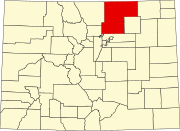Weld County, Colorado
Weld County | |
|---|---|
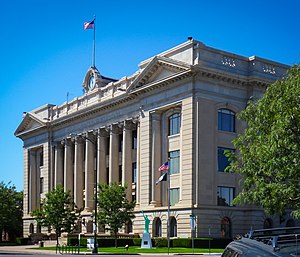 Weld County Courthouse | |
 Location within the U.S. state of Colorado | |
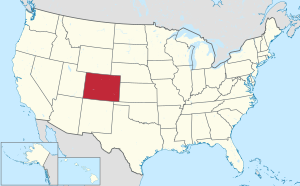 Colorado's location within the U.S. | |
| Coordinates: 40°32′N 104°24′W / 40.54°N 104.4°W | |
| Country | |
| State | |
| Founded | November 3, 1861 |
| Seat | Greeley |
| Largest city | Greeley |
| Area | |
• Total | 4,017 sq mi (10,400 km2) |
| • Land | 3,987 sq mi (10,330 km2) |
| • Water | 30 sq mi (80 km2) 0.7% |
| Population (2020) | |
• Total | 328,981 |
| • Density | 83/sq mi (32/km2) |
| Time zone | UTC−7 (Mountain) |
| • Summer (DST) | UTC−6 (MDT) |
| Congressional districts | 2nd, 4th, 8th |
| Website | www |
Weld County is a county located in the U.S. state of Colorado. As of the 2020 census, the population was 328,981.[1] The county seat is Greeley.[2]
Weld County comprises the Greeley, CO Metropolitan Statistical Area, which is included in the Denver–Aurora, CO Combined Statistical Area.[3]
History

On May 30, 1854, the Kansas–Nebraska Act created the Nebraska Territory and the Kansas Territory, divided by the Parallel 40° North (Baseline Road or County Line Road or Weld County Road 2 in the future Weld County). Present-day Weld County, Colorado, lay in the southwestern portion of the Nebraska Territory, bordering the Kansas Territory.
In July 1858, gold was discovered along the South Platte River in Arapahoe County, Kansas Territory. This discovery precipitated the Pike's Peak Gold Rush. Many residents of the mining region felt disconnected from the remote territorial governments of Kansas and Nebraska, so they voted to form their own Territory of Jefferson on October 24, 1859. The following month, the Jefferson Territorial Legislature organized 12 counties for the new territory, including St. Vrain County. St. Vrain County was named in honor of Ceran de Hault de Lassus de St. Vrain, the French trader who established the first trading post on the upper South Platte River. St. Vrain County encompassed much of what is today Weld County.
The Jefferson Territory never received federal sanction, but on February 28, 1861, U.S. President James Buchanan signed an act organizing the Territory of Colorado.[4] On November 1, 1861, the Colorado General Assembly organized 17 counties, including Weld County, for the new Colorado Territory. Weld County was named for Lewis Ledyard Weld, a lawyer and territorial secretary. He died while serving in the Union Army during the Civil War.[5] Until February 9, 1887, Weld County's boundaries included the area now comprising Weld County, Washington County, Logan County, Morgan County, Yuma County, Phillips County, and Sedgwick County.
Weld County was thrust into the media spotlight on the evening of November 1, 1955, when United Airlines Flight 629, a Douglas DC-6B airliner flying from Denver to Portland, Oregon, exploded in midair and crashed, killing all 44 persons on board the plane and scattering bodies, wreckage and debris over a six-square-mile area of the county. The subsequent investigation of the accident revealed that Denver resident John Gilbert Graham had secretly placed a time bomb composed of 25 sticks of dynamite in a suitcase belonging to his mother, who was a passenger on the airplane. Graham was tried and convicted of the crime, and executed in 1957.
In northeastern Weld County, Minuteman III missile silo "N-8",[6] one of the many unmanned silos there, was the target of symbolic vandalism by Catholic peace activists in 2002.[7][8]
Weld County also holds the distinction of having more confirmed tornado sightings than any other U.S. county from 1950 to 2011, with 252 confirmed reports.[9]
On March 6, 2019, the county declared itself to be a Second Amendment sanctuary.[10]
Secession proposals
In 2013, conservative Weld County commissioners began a campaign to secede from the State of Colorado to create a new state; a state ballot measure regarding the issue was put on the November 2013 ballot. The legality of this initiative has been questioned by local attorneys.[11] On November 5, 2013, 6 out of 11 Colorado counties voted no for secession, including Elbert, Lincoln, Logan, Moffat, Sedgwick, and Weld counties voted no, while Cheyenne, Kit Carson, Phillips, Washington, and Yuma counties voted yes. "Weld County voters said this is an option we shouldn't pursue and we won't pursue it," said Weld County Commissioner Sean Conway, "But we will continue to look at the problems of the urban and rural divide in this state."[12]
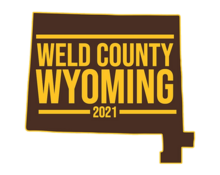
In 2021, a group known as "Weld County, WY" organized a petition to place a measure on the November 2021 ballot for the county to secede from Colorado to join Wyoming, due to a clash between the conservative politics of Weld County and the liberal government of Colorado.[13] Mark Gordon, the Governor of Wyoming, said when asked about the topic, "We would love that."[14] In response to Gordon's comment, Colorado Governor Jared Polis said, "Hands off Weld County."[15]
Geography
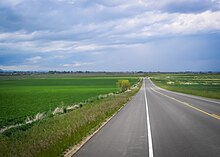

According to the U.S. Census Bureau, the county has a total area of 4,017 square miles (10,400 km2), of which 3,987 square miles (10,330 km2) are land and 30 square miles (78 km2) (0.7%) are water.[16] It is the third-largest county in Colorado by area.
Weld County lies within the relatively flat eastern portion of Colorado; the northeastern portions of the county contain the extensive Pawnee National Grassland and the Pawnee Buttes, which jut 350 feet (110 m) above the surrounding terrain and are surrounded by many small canyons and outcroppings. Along the western border, hilly areas indicate the presence of the foothills of the Rocky Mountains further west.
The county is served by two interstate highways: I-25 (US 87) runs through the southwestern corner and I-76 from the south central edge northeastward to the Morgan county border. Other major roads include US 85 and US 34, which intersect near Greeley, and State Highway 14, which runs through Ault.
Adjacent counties
- Kimball County, Nebraska - northeast
- Logan County - east
- Morgan County - east
- Adams County - south
- City and County of Broomfield - southwest
- Boulder County - west
- Larimer County - west
- Laramie County, Wyoming - northwest
Major highways
 Interstate 25
Interstate 25 Interstate 76
Interstate 76 U.S. Highway 6
U.S. Highway 6 U.S. Highway 34
U.S. Highway 34 U.S. Highway 85
U.S. Highway 85 U.S. Highway 87
U.S. Highway 87 State Highway 7
State Highway 7 State Highway 14
State Highway 14 State Highway 52
State Highway 52 State Highway 56
State Highway 56 State Highway 60
State Highway 60 State Highway 66
State Highway 66 State Highway 71
State Highway 71 State Highway 79
State Highway 79 State Highway 257
State Highway 257 State Highway 392
State Highway 392
Transit
National protected area

State protected area
Trails and byways
- American Discovery Trail
- Pawnee Pioneer Trails[17]
- Poudre River National Recreation Trail[18]
- South Platte Trail
Demographics
| Census | Pop. | Note | %± |
|---|---|---|---|
| 1870 | 1,636 | — | |
| 1880 | 5,646 | 245.1% | |
| 1890 | 11,736 | 107.9% | |
| 1900 | 16,808 | 43.2% | |
| 1910 | 39,177 | 133.1% | |
| 1920 | 54,059 | 38.0% | |
| 1930 | 65,097 | 20.4% | |
| 1940 | 63,747 | −2.1% | |
| 1950 | 67,504 | 5.9% | |
| 1960 | 72,344 | 7.2% | |
| 1970 | 89,297 | 23.4% | |
| 1980 | 123,438 | 38.2% | |
| 1990 | 131,821 | 6.8% | |
| 2000 | 180,936 | 37.3% | |
| 2010 | 252,825 | 39.7% | |
| 2020 | 328,981 | 30.1% | |
| 2023 (est.) | 359,442 | [19] | 9.3% |
| U.S. Decennial Census[20] 1790-1960[21] 1900-1990[22] 1990-2000[23] 2010-2020[1] | |||
As of the census[24] of 2000, there were 180,936 people, 63,247 households, and 45,221 families residing in the county. The population density was 45 people per square mile (17 people/km2). There were 66,194 housing units at an average density of 17 units per square mile (6.6 units/km2). The racial makeup of the county was 81.71% White, 0.56% Black or African American, 0.87% Native American, 0.83% Asian, 0.08% Pacific Islander, 13.29% from other races, and 2.65% from two or more races. 27.05% of the population were Hispanic or Latino of any race.
There were 63,247 households, out of which 37.20% had children under the age of 18 living with them, 57.60% were married couples living together, 9.40% had a female householder with no husband present, and 28.50% were non-families. 21.00% of all households were made up of individuals, and 6.90% had someone living alone who was 65 years of age or older. The average household size was 2.78 and the average family size was 3.25.
In the county, the population was spread out, with 28.20% under the age of 18, 13.20% from 18 to 24, 29.70% from 25 to 44, 20.00% from 45 to 64, and 9.00% who were 65 years of age or older. The median age was 31 years. For every 100 females there were 100.60 males. For every 100 females age 18 and over, there were 98.00 males.
The median income for a household in the county was $42,321, and the median income for a family was $49,569. Males had a median income of $35,037 versus $25,757 for females. The per capita income for the county was $18,957. About 8.00% of families and 12.50% of the population were below the poverty line, including 14.60% of those under age 18 and 8.50% of those age 65 or over.
Economy
Weld County is Colorado's leading producer of cattle, grain and sugar beets, and is the richest agricultural county in the United States east of the Rocky Mountains, and the fourth richest overall nationally. It is also becoming more important as a milk producing county, with close to half of the state's cattle.[25][26] Weld County is also an important area of oil and natural gas production in the Denver-Julesburg Basin.
Communities
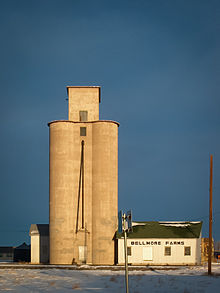
Cities
- Brighton‡
- Dacono
- Evans
- Fort Lupton
- Greeley
- Longmont‡
- Northglenn‡
- Thornton (part)‡
Towns
Census-designated places
Unincorporated communities
Ghost towns
- Adna[27]
- Agricola[27]
- Chapelton[27]
- Chenoa[27]
- Cherokee City[27]
- Cloverly[27]
- Coleman[27]
- Dearfield[27]
- Elwell[28][27]
- Flemings Ranch[27]
- Fort St. Vrain[27]
- Fosston[27]
- Gault[27]
- Geary[27]
- Graham[27]
- Green City[27]
- Highland Lake[27]
- Hillsborough[27]
- Hiltonville[27]
- Hungerford[27]
- Ione[27]
- Kalous[27]
- Kauffman[27]
- Koenig[27]
- Lancaster[27]
- Latham[27]
- Liberty[27]
- Masters[27]
- Nantes[27]
- New Liberty[27]
- Osgood[27]
- Peckham[27]
- Platte Valley[27]
- Raymer[27]
- Rinn[27]
- Rosedale[27]
- Saint Vrain[27]
- Serene[27]
- Sligo[27]
- Spanish Colony[27]
- Wentz[27]
- Zilar[27]
- Zita[27]
‡ means a populated place has portions in an adjacent county or counties
Politics
Similar to the fellow Denver Metropolitan Area county of Douglas, Weld leans Republican. Except for Lyndon Johnson's 1964 landslide win over Barry Goldwater, it has not voted for a Democratic presidential candidate since 1936.
| Year | Republican | Democratic | Third party(ies) | |||
|---|---|---|---|---|---|---|
| No. | % | No. | % | No. | % | |
| 2024 | 106,469 | 59.18% | 68,752 | 38.21% | 4,700 | 2.61% |
| 2020 | 96,145 | 57.58% | 66,060 | 39.56% | 4,769 | 2.86% |
| 2016 | 76,651 | 56.60% | 46,519 | 34.35% | 12,260 | 9.05% |
| 2012 | 63,775 | 54.84% | 49,050 | 42.18% | 3,466 | 2.98% |
| 2008 | 56,526 | 53.39% | 47,292 | 44.67% | 2,048 | 1.93% |
| 2004 | 55,591 | 62.71% | 31,868 | 35.95% | 1,194 | 1.35% |
| 2000 | 37,409 | 57.96% | 23,436 | 36.31% | 3,696 | 5.73% |
| 1996 | 26,518 | 49.67% | 21,325 | 39.94% | 5,547 | 10.39% |
| 1992 | 20,958 | 38.79% | 19,295 | 35.71% | 13,776 | 25.50% |
| 1988 | 26,497 | 55.42% | 20,548 | 42.98% | 762 | 1.59% |
| 1984 | 31,293 | 68.51% | 13,863 | 30.35% | 523 | 1.14% |
| 1980 | 23,901 | 58.80% | 11,433 | 28.13% | 5,312 | 13.07% |
| 1976 | 21,976 | 55.35% | 16,501 | 41.56% | 1,225 | 3.09% |
| 1972 | 24,695 | 66.29% | 11,690 | 31.38% | 870 | 2.34% |
| 1968 | 17,101 | 57.26% | 10,420 | 34.89% | 2,344 | 7.85% |
| 1964 | 12,204 | 41.12% | 17,268 | 58.18% | 207 | 0.70% |
| 1960 | 17,558 | 60.99% | 11,179 | 38.83% | 53 | 0.18% |
| 1956 | 17,228 | 62.75% | 10,170 | 37.04% | 57 | 0.21% |
| 1952 | 18,002 | 66.44% | 8,890 | 32.81% | 204 | 0.75% |
| 1948 | 12,446 | 52.65% | 10,934 | 46.25% | 259 | 1.10% |
| 1944 | 14,546 | 63.01% | 8,459 | 36.64% | 81 | 0.35% |
| 1940 | 16,129 | 59.72% | 10,653 | 39.44% | 227 | 0.84% |
| 1936 | 9,606 | 41.23% | 12,993 | 55.77% | 697 | 2.99% |
| 1932 | 10,754 | 46.87% | 11,182 | 48.73% | 1,009 | 4.40% |
| 1928 | 13,719 | 69.58% | 5,762 | 29.22% | 236 | 1.20% |
| 1924 | 10,185 | 62.68% | 3,406 | 20.96% | 2,659 | 16.36% |
| 1920 | 10,268 | 63.78% | 5,202 | 32.31% | 630 | 3.91% |
| 1916 | 5,395 | 37.12% | 8,600 | 59.18% | 538 | 3.70% |
| 1912 | 3,114 | 27.39% | 4,713 | 41.46% | 3,541 | 31.15% |
| 1908 | 5,537 | 51.05% | 4,650 | 42.87% | 659 | 6.08% |
| 1904 | 4,833 | 62.12% | 2,555 | 32.84% | 392 | 5.04% |
| 1900 | 2,786 | 42.95% | 3,386 | 52.20% | 314 | 4.84% |
| 1896 | 874 | 15.54% | 4,620 | 82.13% | 131 | 2.33% |
| 1892 | 1,138 | 41.10% | 0 | 0.00% | 1,631 | 58.90% |
| 1888 | 1,942 | 57.56% | 1,036 | 30.71% | 396 | 11.74% |
| 1884 | 1,332 | 53.49% | 765 | 30.72% | 393 | 15.78% |
| 1880 | 804 | 56.26% | 373 | 26.10% | 252 | 17.63% |
Education
School districts serving Weld County include:[30]
- Ault-Highland School District RE-9
- Briggsdale School District RE-10
- Eaton School District RE-2
- Greeley School District 6
- Johnstown-Milliken School District RE-5J
- Pawnee School District RE-12
- Platte Valley School District RE-7
- Prairie School District RE-11
- School District 27J
- St. Vrain Valley School District RE 1J
- Thompson School District R-2J
- Weld County School District RE-1
- Weld County School District RE-3J
- Weld County School District RE-8
- Weldon Valley School District RE-20J
- Wiggins School District RE-50J
- Windsor School District RE-4
See also
- Bibliography of Colorado
- Geography of Colorado
- History of Colorado
- Index of Colorado-related articles
- List of Colorado-related lists
- Outline of Colorado
References
- ^ a b "State & County QuickFacts". United States Census Bureau. Retrieved September 5, 2021.
- ^ "Find a County". National Association of Counties. Retrieved June 7, 2011.
- ^ "OMB Bulletin No. 10-02: Update of Statistical Area Definitions and Guidance on Their Uses" (PDF). Office of Management and Budget. December 1, 2009. Archived (PDF) from the original on January 21, 2017. Retrieved April 19, 2012 – via National Archives.
- ^ "An Act to provide a temporary Government for the Territory of Colorado" (PDF). Thirty-sixth United States Congress. February 28, 1861. Archived (PDF) from the original on October 25, 2004. Retrieved November 26, 2007.
- ^ "Weld County, Colorado County Information". ePodunk. Archived from the original on July 11, 2014. Retrieved November 5, 2013.
- ^ "Warren AFB Minuteman Missile Site Coordinates". Asuwlink.uwyo.edu. Archived from the original on June 25, 2014. Retrieved November 5, 2013.
- ^ [1] Archived July 7, 2007, at the Wayback Machine
- ^ [2] Archived September 27, 2007, at the Wayback Machine
- ^ "Map: U.S. Tornadoes by County, 1950-2011 - U.S. Tornadoes". U.S. Tornadoes. May 22, 2012. Retrieved June 29, 2018.
- ^ "Resolution declares Weld County to be a 'Second Amendment sanctuary'". FOX31 Denver. March 6, 2019. Retrieved January 4, 2020.
- ^ Romano, Analisa (October 9, 2013). "Greeley Attorneys Question Legality Of Weld Commissioners Advocating For 51st State". The Greeley Tribune (via Huffington Post). Retrieved October 11, 2013.
- ^ Whaley, Monte (November 5, 2013). "51st state question answered "no" in 6 of 11 counties contemplating secession". www.denverpost.com. The Denver Post. Retrieved March 6, 2014.
- ^ Gstalter, Morgan (January 29, 2021). "Group in Colorado county seeks secession from state to join Wyoming". Retrieved January 29, 2021.
- ^ Reynolds, Nick (February 2, 2021). "Gordon on Weld County secession: 'We would love that'". Casper Star-Tribune. Retrieved February 2, 2021.
- ^ Holdman, Raetta (February 4, 2021). "Gov. Jared Polis Tells Wyoming Governor 'Hands Off Weld County'". Retrieved February 6, 2021.
- ^ "US Gazetteer files: 2010, 2000, and 1990". United States Census Bureau. February 12, 2011. Retrieved April 23, 2011.
- ^ "Pawnee Pioneer Trails". Colorado Department of Transportation. Retrieved March 2, 2020.
- ^ "Cache la Poudre - North Park". Colorado Department of Transportation. Retrieved March 2, 2020.
- ^ "Annual Estimates of the Resident Population for Counties: April 1, 2020 to July 1, 2023". United States Census Bureau. Retrieved March 31, 2024.
- ^ "U.S. Decennial Census". United States Census Bureau. Retrieved June 11, 2014.
- ^ "Historical Census Browser". University of Virginia Library. Retrieved June 11, 2014.
- ^ "Population of Counties by Decennial Census: 1900 to 1990". United States Census Bureau. Retrieved June 11, 2014.
- ^ "Census 2000 PHC-T-4. Ranking Tables for Counties: 1990 and 2000" (PDF). United States Census Bureau. Archived (PDF) from the original on March 27, 2010. Retrieved June 11, 2014.
- ^ "U.S. Census website". United States Census Bureau. Retrieved May 14, 2011.
- ^ "Weld County: About Weld". Co.weld.co.us. Retrieved November 5, 2013.
- ^ "Welcome to Upstate Colorado Economic Development". Archived from the original on February 13, 2011.
- ^ a b c d e f g h i j k l m n o p q r s t u v w x y z aa ab ac ad ae af ag ah ai aj ak al am an ao ap aq "Ghost Towns in Weld County". history.weldgov.com. Retrieved November 16, 2023.
- ^ Hovey, Edmund Otis (November 30, 1925). "A New Meteoric Stone from Johnstown, Weld County, Colorado". American Museum Novitates. New York City: The American Museum of Natural History.
- ^ Leip, David. "Dave Leip's Atlas of U.S. Presidential Elections". uselectionatlas.org. Retrieved November 27, 2020.
- ^ "2020 CENSUS - SCHOOL DISTRICT REFERENCE MAP: Weld County, CO" (PDF). U.S. Census Bureau. Archived (PDF) from the original on July 19, 2022. Retrieved July 19, 2022. - Text list

